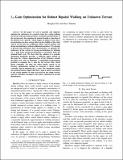L[subscript 2]-gain optimization for robust bipedal walking on unknown terrain
Author(s)
Dai, Hongkai; Tedrake, Russell Louis
DownloadTedrake_L2-gain.pdf (299.6Kb)
OPEN_ACCESS_POLICY
Open Access Policy
Creative Commons Attribution-Noncommercial-Share Alike
Terms of use
Metadata
Show full item recordAbstract
In this paper we seek to quantify and explicitly optimize the robustness of a control system for a robot walking on terrain with uncertain geometry. Geometric perturbations to the terrain enter the equations of motion through a relocation of the hybrid event “guards” which trigger an impact event; these perturbations can have a large effect on the stability of the robot and do not fit into the traditional robust control analysis and design methodologies without additional machinery. We attempt to provide that machinery here. In particular, we quantify the robustness of the system to terrain perturbations by defining an L[subscript 2] gain from terrain perturbations to deviations from the nominal limit cycle. We show that the solution to a periodic dissipation inequality provides a sufficient upper bound on this gain for a linear approximation of the dynamics around the limit cycle, and we formulate a semidefinite programming problem to compute the L[subscript 2] gain for the system with a fixed linear controller. We then use either binary search or an iterative optimization method to construct a linear robust controller and to minimize the L[subscript 2] gain. The simulation results on canonical robots suggest that the L[subscript 2] gain is closely correlated to the actual number of steps traversed on the rough terrain, and our controller can improve the robot's robustness to terrain disturbances.
Date issued
2013-05Department
Massachusetts Institute of Technology. Computer Science and Artificial Intelligence Laboratory; Massachusetts Institute of Technology. Department of Electrical Engineering and Computer ScienceJournal
Proceedings of the 2013 IEEE International Conference on Robotics and Automation
Publisher
Institute of Electrical and Electronics Engineers (IEEE)
Citation
Dai, Hongkai, and Russ Tedrake. “L[subscript 2]-Gain Optimization for Robust Bipedal Walking on Unknown Terrain.” 2013 IEEE International Conference on Robotics and Automation (May 2013).
Version: Author's final manuscript
ISBN
978-1-4673-5643-5
978-1-4673-5641-1
ISSN
1050-4729
